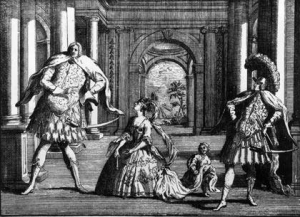 In an article by James Fenton on changing fortunes in Handel operas, the following passage noted the recent AAM performance of Flavio at the Barbican:
In an article by James Fenton on changing fortunes in Handel operas, the following passage noted the recent AAM performance of Flavio at the Barbican:
'As for the operas, matters were even worse. The operas were dead. "Occasional attempts at revival, although revealing untold glories to musicians of sober and patient tastes, have only shown that there is no hope of ever restoring these works to a stage which no longer resorts to extravagant sumptuousness of production for its own sake, nor has any use for the stiff formality of endless successions of da capo arias."
Handel's fortune really was at its nadir when his supporters, not his detractors, spoke in this way. Blom goes on: "The fact is that Handel's operas are merely so many secular oratorios in costume, on the whole less dramatic than the oratorios themselves because they lack the choral climaxes, and that we might as well think of building flats and factories in the baroque manner as of putting them on stage again except occasionally and experimentally."
I was thinking of this passage during Christopher Hogwood's concert performance of Handel's Flavio, re de'Langobardi at the Barbican a few days ago. A succession, yes, although not an endless succession, of arias; a plot that was of no great concern to the audience; rather little recitative; but a fluent and unhesitating progression through the score, which came over like a succession of demonstrations: this is what it is like to be angry, to feel vengeful, to be in love, to mourn, to be triumphant. It was like an unfolding essay in the emotions, acted out both through the singing voices and through the descriptive power of the orchestration.
The practice of concert performances of rare operas, with or without some element of acting, of semi-staging (in this case largely confined to some interaction between the singers, according to the demands of the script) - how simple it all seemed to achieve. How unproblematic. How impossible (it would appear) to predict in 1935.' James Fenton
To read the whole article visit www.guardian.co.uk